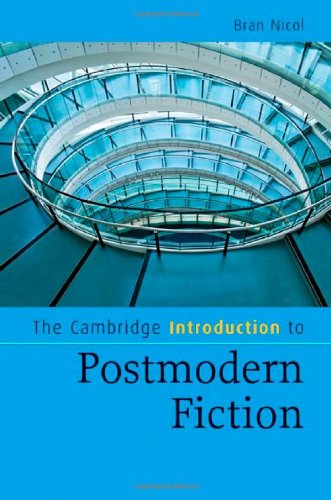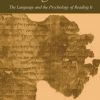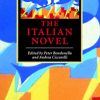(Ebook PDF) The Cambridge Introduction to Postmodern Fiction 1st Edition Bran Nicol ISBN 9780511636721 0511636725 full chapters
$50.00 Original price was: $50.00.$35.00Current price is: $35.00.
The Cambridge Introduction to Postmodern Fiction Cambridge Introductions to Literature 1st Edition Bran Nicol Digital Instant Download
Author(s): Bran Nicol
ISBN(s): 9780521861571, 0521861578
Edition: 1
File Details: PDF, 1.32 MB
Year: 2009
Language: english
(Ebook PDF) The Cambridge Introduction to Postmodern Fiction 1st Edition Bran Nicol-Ebook PDF Instant Download/Delivery:9780511636721, 0511636725
Instant download Full Chapter of The Cambridge Introduction to Postmodern Fiction 1st Edition after payment

Product details:
ISBN 10:0511636725
ISBN 13:9780511636721
Author: Bran Nicol
Postmodern fiction presents a challenge to the reader: instead of enjoying it passively, the reader has to work to understand its meanings, to think about what fiction is, and to question their own responses. Yet this very challenge makes postmodern writing so much fun to read and rewarding to study. Unlike most introductions to postmodernism and fiction, this book places the emphasis on literature rather than theory. It introduces the most prominent British and American novelists associated with postmodernism, from the ‘pioneers’, Beckett, Borges and Burroughs, to important post-war writers such as Pynchon, Carter, Atwood, Morrison, Gibson, Auster, DeLillo, and Ellis. Designed for students and clearly written, this Introduction explains the preoccupations, styles and techniques that unite postmodern authors. Their work is characterized by a self-reflexive acknowledgement of its status as fiction, and by the various ways in which it challenges readers to question common-sense and commonplace assumptions about literature.
Table of Contents:
- Introduction Postmodernism and postmodernity
- Postmodernity and ‘late capitalism’
- Baudrillard and simulation
- Poststructuralism, postmodernism, and ‘the real’
- Sociology and the construction of reality
- Jameson and the crisis in historicity
- Lyotard and the decline of the metanarrative
- Irony and ‘double-coding’
- Chapter 1 Postmodern fiction: theory and practice
- An incredulity towards realism
- Realism and modernism
- Postmodernism and the French nouveau roman
- Where postmodern fiction begins
- The fictional world is not like ours
- Narrative is not ‘natural’
- Modernism, referentiality, and the avant-garde
- What postmodern fiction does
- Hutcheon and the ‘double-coding’ of postmodern fiction
- McHale’s poetics of postmodernism
- Metafiction
- How to read postmodern fiction
- Susan Sontag and the ‘erotics’ of reading
- Roland Barthes and the ‘writerly’ text
- ‘Paranoid reading’ and ‘rhizomatic reading’
- Chapter 2 Early postmodern fiction: Beckett, Borges, and Burroughs
- Samuel Beckett
- Jorge Luis Borges
- William Burroughs
- Chapter 3 US metafiction: Coover, Barth, Nabokov, Vonnegut, Pynchon
- Barth’s Funhouse and Coover’s Descants
- Vladimir Nabokov, Pale Fire
- Kurt Vonnegut, Slaughterhouse-Five
- Thomas Pynchon
- Chapter 4 The postmodern historical novel: Fowles, Barnes, Swift
- Historiographic metafiction
- British historiographic metafiction
- John Fowles, The French Lieutenant’s Woman
- Graham Swift, Waterland
- Julian Barnes, Flaubert’s Parrot
- Chapter 5 Postmodern-postcolonial fiction
- Salman Rushdie, Midnights Children
- Toni Morrison, Beloved
- Ishmael Reed, Mumbo Jumbo
- Chapter 6 Postmodern fiction by women: Carter, Atwood, Acker
- Angela Carter
- Margaret Atwood
- Kathy Acker
- Chapter 7 Two postmodern genres: cyberpunk and ‘metaphysical’ detective fiction
- Sci-fi and cyberpunk
- William Gibson, Neuromancer
- Detective fiction
- Jorge Luis Borges, ‘Death and the Compass’
- Umberto Eco, The Name of the Rose
- Paul Auster, City of Glass
- Chapter 8 Fiction of the ‘postmodern condition’: Ballard, DeLillo, Ellis
- Conclusion: ‘ficto-criticism’
- J. G. Ballard, Crash
- Don DeLillo, White Noise and Libra
- Bret Easton Ellis, American Psycho
- References
People also search:
bran nicol the cambridge introduction to postmodern fiction
the cambridge introduction to postmodern fiction pdf
british postmodern authors
postmodern age in english literature
what is post postmodern literature
Tags:
Bran Nicol,Cambridge Introduction,Postmodern Fiction,Literature


